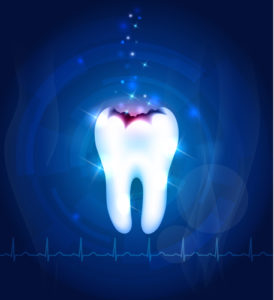 Atherosclerosis – a term for the hardening and/or thickening of arteries – occurs when cholesterol, fats, and other substances build up to form plaque along the walls of arteries. Depending on their size, these plaques can partially or fully block blood flow in the artery. When this blockage occurs in coronary arteries, it could eventually result in a heart attack.
Atherosclerosis – a term for the hardening and/or thickening of arteries – occurs when cholesterol, fats, and other substances build up to form plaque along the walls of arteries. Depending on their size, these plaques can partially or fully block blood flow in the artery. When this blockage occurs in coronary arteries, it could eventually result in a heart attack.
It’s long been established that gum disease and heart disease have a common link. Past research has proved that Porphyromonas gingivalis (a bacterium involved in the development of gum disease) is present in the coronary artery plaques of individuals who have suffered a heart attack. In addition, previous studies also found that this particular bacterium not only triggers but accelerates atherosclerosis in coronary arteries, including the aorta – the main artery responsible for delivering blood from the heart to the rest of the body. What hasn’t been entirely clear all this time, however, is the microbiology underlying the connection between gum disease and heart disease. That is, until now.
According to a new study conducted at Orebro University in Sweden, Porphyromonas gingivalis is responsible for boosting inflammation and atherosclerosis in coronary arteries. When researchers injected Porphyromonas gingivalis into samples of smooth muscle cells (the types of muscle cells found in the aorta), they discovered that the bacterium secreted particular enzymes that changed the ratio between two proteins, one of which is pro-inflammatory and the other anti-inflammatory. This change in ratio led to a boost in inflammation, which is believed to play a significant role in atherosclerosis.
Ultimately, research is continuously being conducted to learn as much as possible about the correlation between gum disease and heart disease, and though we currently don’t know everything about the relationship of the two diseases, one thing is clear: they are linked strongly by the presence of Porphyromonas gingivalis. To help reduce your risk of developing gum disease by limiting the development and/or presence of Porphyromonas gingivalis in your mouth, it’s imperative that you brush and floss at least twice daily, as well as be sure to schedule professional dental cleanings two times a year. Remember, being proactive about your oral health can often be the best form of treatment.
Contact Our Practice
To learn more, or if you wish to schedule an appointment at our office, please contact North Scottsdale Dental Studio today.
Previous Post Next Post


